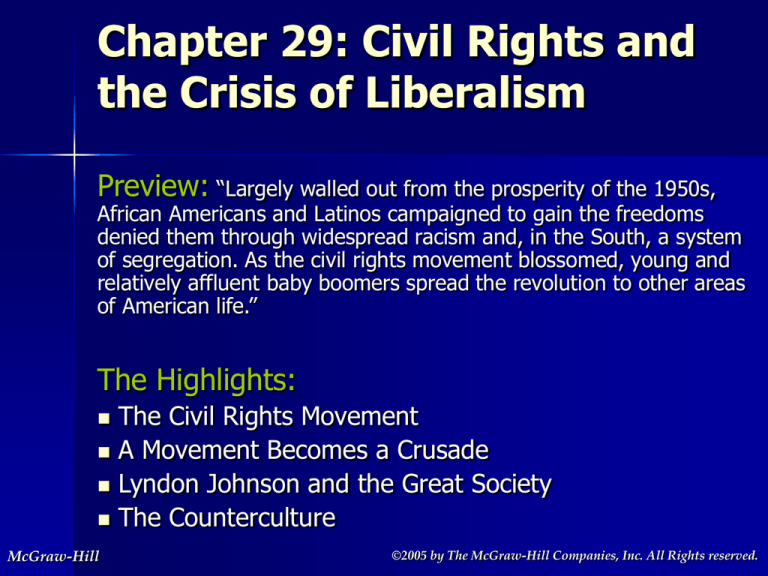
Chapter 29: Civil Rights and
the Crisis of Liberalism
Preview: “Largely walled out from the prosperity of the 1950s,
African Americans and Latinos campaigned to gain the freedoms
denied them through widespread racism and, in the South, a system
of segregation. As the civil rights movement blossomed, young and
relatively affluent baby boomers spread the revolution to other areas
of American life.”
The Highlights:
McGraw-Hill
The Civil Rights Movement
A Movement Becomes a Crusade
Lyndon Johnson and the Great Society
The Counterculture
©2005 by The McGraw-Hill Companies, Inc. All Rights reserved.
29-2
The Civil Rights Movement
The Changing South and African
Americans
– Mechanized cotton farming
– Lumber industry provided most jobs for
African Americans outside of cotton
farming
McGraw-Hill
©2005 by The McGraw-Hill Companies, Inc. All Rights reserved.
The NAACP and Civil Rights
29-3
– Thurgood Marshall
– NAACP chose not to attack head-on the
Supreme Court decision of Plessy v.
Ferguson
The Brown Decision
– Overturning Plessy
– “Southern Manifesto” issued by 19 U.S.
senators and 81 representatives to
reestablish legalized segregation
Latino Civil Rights
– Delgado and segregated schools
– Hernandez and desegregation
McGraw-Hill
©2005 by The McGraw-Hill Companies, Inc. All Rights reserved.
“Neither the Brown nor the Hernández decisions ended
segregation, but they combined with political and economic
forces to usher in a new era of southern race relations”(983).
29-4
A New Civil Rights Strategy
– Rosa Parks
– Martin Luther King, Jr.
Little Rock and the White Backlash
– Mob greets nine black students
– National Guard preserved order for a year
McGraw-Hill
©2005 by The McGraw-Hill Companies, Inc. All Rights reserved.
A Movement Becomes a
Crusade
29-5
Riding to Freedom
– Newer civil rights organizations
– Kennedy hedged on his promise to
introduce major civil rights legislation
Civil Rights at High Tide
– James Meredith
– “Letter from Birmingham Jail”
– The march on Washington
McGraw-Hill
©2005 by The McGraw-Hill Companies, Inc. All Rights reserved.
29-6
McGraw-Hill
©2005 by The McGraw-Hill Companies, Inc. All Rights reserved.
29-7
The Fire Next Time
– Tragedy in Dallas: JFK assassinated,
November 22, 1963
– LBJ and the Civil Rights Act of 1964
– Voting Rights Act of 1965
Black Power
– Malcolm X
– Black Panthers
McGraw-Hill
©2005 by The McGraw-Hill Companies, Inc. All Rights reserved.
29-8
“The growing white backlash and the anger exploding in the
nation’s cities exposed serious flaws in the theory and practice
of liberal reform”(991).
Violence in the Streets
– Riots in Harlem, Rochester, Watts area of
L.A., Chicago, Newark and Detroit
– White backlash and anger exposed
serious flaws n the theory and practice of
liberal reform
McGraw-Hill
©2005 by The McGraw-Hill Companies, Inc. All Rights reserved.
29-9
Lyndon Johnson and the Great
Society
The Origins of the Great Society
– Discovering poverty
– The liberal tradition
The Election of 1964
– “Great Society” in which poverty and racial
injustice no longer exist
– Johnson won by a landslide
McGraw-Hill
©2005 by The McGraw-Hill Companies, Inc. All Rights reserved.
29-10
The Great Society
– Programs in education
– Medicare and Medicaid
– HUD
– Immigration reform
– The environment
Evaluating the Great Society
– Conservatives and radicals objected that the
liberal welfare state was too intrusive
– The tradition of liberalism prevailed
McGraw-Hill
©2005 by The McGraw-Hill Companies, Inc. All Rights reserved.
“Although Lyndon Johnson and the Congress left the stamp of
liberalism on federal power during the decade, the third
branch of government played a role that, in the long run,
proved equally significant”(996).
29-11
The Reforms of the Warren Court
– Protecting due process
– Banning school prayer
– One person, one vote
McGraw-Hill
©2005 by The McGraw-Hill Companies, Inc. All Rights reserved.
29-12
McGraw-Hill
©2005 by The McGraw-Hill Companies, Inc. All Rights reserved.
29-13
The Counterculture
Activists on the New Left
– SDS and Port Huron
– The Free Speech Movement
– Freedom Summer of 1964
The Rise of the Counterculture
– Politics rejected for a lifestyle of
experimentation with music, sex and
drugs
– The Electric Kool-Aid Acid Test
McGraw-Hill
©2005 by The McGraw-Hill Companies, Inc. All Rights reserved.
The Rock Revolution
29-14
– The Beatles
– Dylan
– Soul Music
The West Coast Scene
– The counterculture signaled the
increasing importance of the West Coast
in American popular culture
– The hippies
– The Woodstock Music Festival (1969)
McGraw-Hill
©2005 by The McGraw-Hill Companies, Inc. All Rights reserved.






